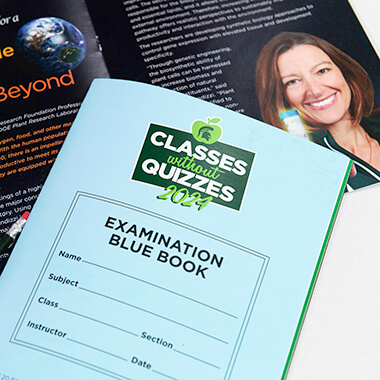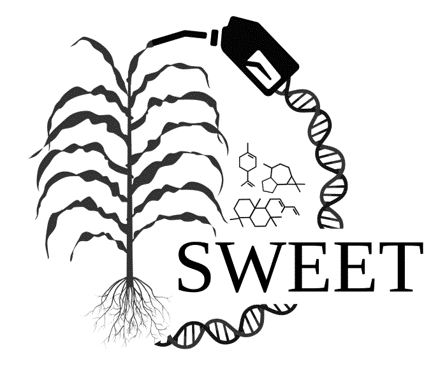Kaylie Barton wins first prize at UURAF 2021
Kaylie Barton, a recently graduated undergraduate student in the lab of Dr. Federica Brandizzi, has won first prize at the 2021 University Undergraduate Research and Arts Forum (UURAF). Kaylie was recognized for her poster presentation in the Plant Sciences category.
Each spring, the UURAF gives MSU undergrads the chance to, “showcase their scholarship and creative activity… gain experience in presenting their research, answer questions about their work from audience members and guests, and receive constructive feedback from judges.” The best presenter in each category is awarded $100.
Kaylie, who graduated this May 2021 with a B.S. in Biochemistry and Molecular Biology with a concentration in Biotechnology and a minor in Plant, Animal, and Microbial Biotechnology, shared her reflections on the UURAF experience. Following are excerpts from the interview.
How did you get interested in majoring in science?
I loved my biology and chemistry classes in high school. When I came to MSU, I knew I wanted to do something with biochemistry. At first, I had no idea what ‘biochemistry’ meant. By chance, I took a laboratory class, and I was assigned to the lab of Dr. Christoph Benning at the MSU-DOE Plant Research Laboratory in order to get practical research experience. I got to learn various laboratory techniques and fell in love with working with plants and doing the research. I also learned WHY the different techniques were useful and what type of information they yielded.
After I completed the class, I received an email stating that Dr. Federica Brandizzi wanted to hire an undergraduate student. I interviewed for it, and even though I was still new at research, my class experience got me through the door.

Courtesy of Kaylie Barton
What is your current research project?
The Brandizzi lab studies a mechanism called the Unfolded Protein Response (UPR). It is a way by which plants protect themselves from certain stressful situations, like drought, external attacks by pests, or the rigors of seed development, for example.
My project was to look at one gene that helps manage UPR activity in plants. We recently found this gene and had an idea of what it does, and my job was to take a deeper look at its function and to determine how exactly it influences the UPR. The project required me to do a lot of stress tests on plants to see how the gene reacted.
I’d like to point out that I decided to take control of my own project during my senior year. I spent three years with the Brandizzi lab, and the first two were spent doing a lot of manual labor for my mentors, Dr. Noelia Pastor-Cantinazo and Dr. Yunting Pu. Their mentorship taught me a lot about the basics of doing research.
But I wanted to go further. When I enrolled in my senior thesis class, Federica and Noelia approved my own research project, which was the basis of my thesis and of the presentation I gave at UURAF.

Courtesy of Kaylie Barton
What do you think gave you the edge to win at UURAF?
MSU has so many research experiences for students, all over campus! In order to be competitive, I feel you have to have an interest in learning, and you need the motivation to do your own lab work, because you won’t necessarily be required to do more than basic labor, like cleaning or prep.
I could have gotten away with 3 years of labor as an undergraduate employee. What set me apart, I think, is that I wanted to contribute to the research. I wanted to figure out the whys and the hows.
Luckily, my mentors were super passionate about their research, which instilled the passion in me. And when I had any questions, they took time out of their schedules to teach me what I wanted to learn.
At the UURAF, my experience and deep knowledge of the research set me apart. I was so comfortable, the talk flowed nicely, and I think the judges felt my excitement and confidence throughout the presentation.
On the flipside, what would you do better next time you presented?
I have a tendency to to add too much information to a poster that it becomes wordy. I also should work on explaining scientific concepts in laymen’s terms. I’d like to come up with an elevator pitch that I can use to explain my work to a kindergartner.
What is next for you, now that you have graduated?
I’ll be going straight to graduate school. I’ll start a PhD program at Washington State University’s (WSU) School of Molecular Biosciences this fall. I also got a National Institutes of Health Protein Biotechnology training fellowship that will allow me to work in the Molecular Plant Sciences department as well.
I want to thank Dr. Bjoern Hamberger at MSU for guiding me during my search for a graduate program. I’m interested in doing plant genetic modification for pharmaceutical research and development, and Dr. Hamberger suggested I look at Dr. Mark Lange’s group at WSU.
Down the road, I’m not sure yet whether I’ll end up in academia or in an industry position, but I’m excited about what comes up next for me!
By Igor Houwat, Kaylie Barton; Banner image courtesy of Kaylie Barton



